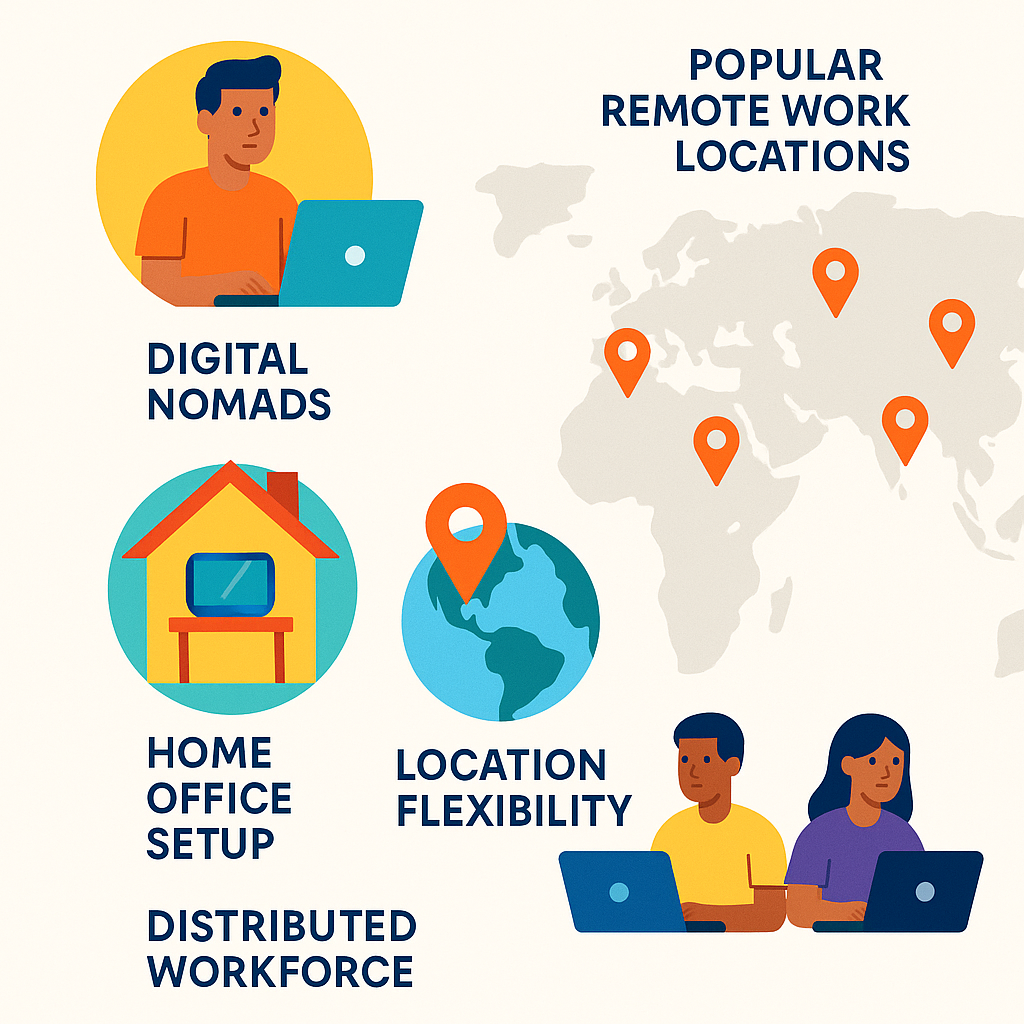Blog > Employee Housing Benefits for Remote Workers: Location-Independent Support Strategies
Employee Housing Benefits for Remote Workers: Location-Independent Support Strategies
by

Executive Summary: Remote Work Housing Revolution
The shift to remote and distributed work has fundamentally transformed employee housing needs, creating demand for location-independent benefits that support geographic flexibility. Remote worker housing programs must address unique challenges including relocation support, multi-location assistance, cost-of-living variations, and digital nomad lifestyles. Forward-thinking organizations implementing remote-specific housing benefits achieve 89% higher retention among distributed teams and gain competitive advantages in the global talent market.
Remote Worker Housing Benefits Impact:
- Global Talent Access: Recruit from anywhere without location constraints
- Higher Retention: 89% improvement in remote worker retention
- Geographic Arbitrage: Enable employees to optimize cost-of-living choices
- Lifestyle Support: Accommodate digital nomad and flexible living preferences
- Competitive Differentiation: Stand out in remote talent marketplace
The Remote Worker Housing Landscape
Remote Workforce Demographics and Needs
Remote Worker Housing Profile:
- Geographic Distribution: 67% of remote workers have relocated since 2020
- Mobility Preferences: 43% plan to move again within 2 years
- Housing Priorities: 84% prioritize home office space and internet reliability
- Cost Optimization: 71% moved to areas with lower cost-of-living
- Lifestyle Focus: 58% chose locations based on quality of life factors
Unique Remote Worker Challenges
| Challenge | % Affected | Impact | Solution |
|---|---|---|---|
| Market Unfamiliarity | 78% | Extended search time | Local market expertise |
| Remote Viewing Limitations | 89% | Travel costs, uncertainty | Virtual tour services |
| Home Office Requirements | 92% | Limited suitable options | Workspace-focused search |
| Relocation Logistics | 85% | Stress, time, cost | Comprehensive relocation support |
Geographic Flexibility Program Design
Location-Agnostic Benefit Structure
Flexible Housing Support Framework:**
- Universal Access: Benefits available regardless of employee location
- Scalable Assistance: Adjustments based on local market conditions
- Multi-Transaction Support: Assistance for multiple moves during employment
- International Capability: Cross-border support for global remote workers
- Temporary Housing: Short-term accommodation during transitions
Cost-of-Living Adjustment Integration
Smart Adjustment Strategies:
- Regional Benefit Scaling: Higher assistance in expensive markets
- Purchasing Power Optimization: Benefits that maintain lifestyle quality
- Market Intelligence: Real-time data for location-based adjustments
- Employee Choice: Flexibility to optimize personal cost-benefit equation
- Performance Incentives: Enhanced benefits for high-performing remote workers
Relocation Support for Remote Teams
Comprehensive Relocation Services
End-to-End Relocation Support:**
- Destination Research: Market analysis and neighborhood recommendations
- House Hunting Assistance: Virtual and in-person property tours
- Moving Coordination: Professional moving services and logistics
- Temporary Lodging: Extended stay accommodations during transition
- Utility Setup: Essential services coordination and activation
- Community Integration: Local connections and resource introductions
Remote Worker Relocation Timeline
| Phase | Timeline | Key Activities | Support Provided |
|---|---|---|---|
| Pre-Decision | Weeks 1-4 | Location research, market analysis | Data reports, expert consultation |
| House Hunting | Weeks 5-8 | Property search, virtual tours | Agent coordination, tour scheduling |
| Transaction | Weeks 9-12 | Offer, negotiation, closing | Professional guidance, coordination |
| Relocation | Weeks 13-16 | Moving, setup, integration | Moving services, utility coordination |
Digital Nomad and Location-Independent Benefits
Supporting the Nomadic Workforce
Nomad-Friendly Benefit Features:**
- Short-Term Housing: Monthly and quarterly rental assistance
- Co-Living Support: Professional co-living space partnerships
- Workspace Access: Global co-working space memberships
- Travel Coordination: Housing search in advance of relocation
- Emergency Housing: Rapid accommodation for unexpected needs
Global Nomad Program Structure
Tiered Nomad Support:
- Tier 1 - Explorer: Basic accommodation and workspace access
- Tier 2 - Traveler: Enhanced relocation support and local services
- Tier 3 - Global Citizen: Premium concierge and comprehensive support
- Custom Packages: Tailored solutions for unique nomadic lifestyles
- Family Programs: Specialized support for nomadic families
Multi-Location Housing Assistance
Distributed Living Support
Multi-Location Program Components:**
- Primary Residence Support: Main home purchase assistance
- Secondary Location Aid: Seasonal or temporary housing support
- Rental Assistance: Multiple location rental coordination
- Property Management: Multi-home management and coordination
- Tax Optimization: Multi-state residence tax planning support
Hybrid Work Location Strategy
Supporting Flexible Work-Life Integration:**
- Office Proximity Options: Housing near occasional office visits
- Seasonal Relocations: Weather-based temporary relocations
- Family Consideration:**strong> Multi-generational and extended family proximity
- Lifestyle Optimization: Recreation and hobby-focused location choices
Technology Infrastructure for Distributed Support
Digital-First Service Delivery
Technology-Enabled Remote Support:**
- Virtual Reality Tours: Immersive property viewing experiences
- AI-Powered Matching: Intelligent property recommendations
- Mobile-First Platform: Full-featured smartphone access
- Video Consultation: Face-to-face expert guidance anywhere
- Digital Documentation: Paperless transaction management
Global Service Network
| Region | Coverage | Local Partners | Service Hours |
|---|---|---|---|
| North America | 100% metro coverage | 2,500+ agents | 24/7 |
| Europe | Major cities | 800+ agents | Business hours + emergency |
| Asia-Pacific | Select markets | 400+ agents | Regional business hours |
Tax and Compliance Considerations for Remote Benefits
Multi-State Tax Complexity
Remote Worker Tax Challenges:**
- State Income Tax: Multiple state filing requirements
- Benefit Taxation: Varying state treatment of employer benefits
- Reciprocity Agreements: Interstate tax treaty considerations
- Temporary vs. Permanent: Duration-based tax classification
- International Complications: Tax treaty and foreign income rules
Compliance Framework
Remote Benefits Compliance Strategy:
- Professional Tax Support: Multi-state tax planning assistance
- Documentation Standards: Comprehensive record-keeping protocols
- Regular Updates: Monitoring changing state and local requirements
- Employee Education: Tax implication awareness and guidance
- Vendor Coordination: Ensuring partner compliance across jurisdictions
Cost-of-Living Adjustments and Support
Dynamic Cost-of-Living Framework
Smart Adjustment Methodology:**
- Real-Time Data: Current market costs and housing price indices
- Quality of Life Factors: Beyond cost to include lifestyle value
- Employee Choice: Opt-in/out flexibility for location changes
- Performance Correlation: Merit-based adjustment considerations
- Market Competitiveness: Industry benchmarking for remote pay scales
Geographic Arbitrage Benefits
Mutual Value Creation:**
- Employee Advantage: Higher purchasing power in lower-cost areas
- Employer Benefit: Reduced total compensation costs
- Talent Expansion: Access to broader geographic talent pools
- Retention Enhancement: Lifestyle optimization improves job satisfaction
Building Community Through Housing Benefits
Remote Worker Community Programs
Social Connection Initiatives:**
- Regional Meetups: Local employee gatherings and networking
- Co-Living Networks: Connecting remote workers in shared housing
- Digital Communities: Online forums for housing and relocation advice
- Mentorship Programs: Experienced remote workers guiding newcomers
- Cultural Integration: Local community involvement and participation
Company Culture in Distributed Teams
Culture Building Through Housing Support:
- Shared Experiences: Common challenges create team bonding
- Success Stories: Celebrating employee relocation and housing successes
- Company Values: Demonstrating care for employee well-being
- Peer Support: Encouraging employee-to-employee assistance
- Recognition Programs: Highlighting successful remote work transitions
Future-Proofing Remote Housing Programs
Emerging Remote Work Trends
2025+ Remote Housing Evolution:**
- AI-Powered Location Matching: Intelligent destination recommendations
- Virtual Reality Integration: Immersive property and neighborhood tours
- Blockchain Verification: Secure, transparent rental and purchase processes
- Sustainability Focus: Green housing and environmental impact consideration
- Wellness Integration: Mental health and lifestyle optimization in housing choices
Scalability and Adaptation
Program Evolution Strategies:**
- Modular Design: Flexible program components that adapt to changing needs
- Data-Driven Optimization: Continuous improvement based on utilization analytics
- Partner Network Expansion: Growing global service coverage
- Technology Investment: Staying ahead of digital transformation
- Employee Feedback Integration: Regular program refinement based on user input
Case Studies: Remote Housing Success Stories
Tech Startup Global Expansion
Challenge: SaaS company wanted to hire globally without geographic constraints
Solution: Comprehensive remote worker housing program with global coverage
Results:
- Expanded talent pool to 15 countries
- 78% of new hires utilized relocation assistance
- 94% employee satisfaction with housing support
- 43% reduction in hiring costs through geographic arbitrage
Financial Services Distributed Team
Challenge: Investment firm transitioning to permanent remote work model
Solution:** Multi-tier program supporting various remote work lifestyles
Results:**
- 89% employee retention during remote transition
- 67% of workforce relocated to preferred locations
- $2.1M annual savings in real estate costs
- 156% ROI on housing benefit investment
Implementation Guide for Remote Housing Benefits
Phase 1: Assessment and Planning
Months 1-2:**
- Remote workforce needs analysis
- Current employee location mapping
- Competitor benefit analysis
- Budget and resource planning
Phase 2: Program Design and Partners
Months 3-4:**
- Benefit structure design
- Technology platform selection
- Global partner network establishment
- Compliance and legal review
Phase 3: Launch and Optimization
Months 5-6:**
- Pilot program with select employees
- Full program rollout and communication
- Performance monitoring and adjustment
- Continuous improvement implementation
FAQs
- How do remote housing benefits differ from traditional programs?
- Remote benefits emphasize geographic flexibility, multiple relocations, virtual support services, and cost-of-living adjustments rather than single-location assistance.
- Can small companies afford remote worker housing benefits?
- Yes, scalable programs can start with basic relocation support and concierge services, expanding as the remote workforce grows.
- How do tax implications work for remote employees across states?
- Multi-state tax complexity requires professional guidance and careful documentation, with benefit taxation varying by state and duration of residence.
- What technology is essential for remote housing benefit delivery?
- Mobile-first platforms, virtual tour capabilities, digital documentation, and global communication tools are fundamental for effective remote support.
Launch Remote Worker Housing Benefits
RECN's location-independent housing benefits support your distributed workforce anywhere in the world. Global coverage, local expertise, digital-first delivery.
Conclusion: Enabling Location-Independent Success
Employee housing benefits for remote workers represent the future of distributed workforce support, enabling organizations to compete globally for talent while supporting employee lifestyle optimization. Through location-independent programs that combine technology, global partnerships, and flexible support structures, companies can build loyal, productive remote teams that thrive regardless of geographic boundaries. The investment in remote worker housing benefits generates returns through expanded talent access, improved retention, and competitive differentiation in the evolving world of work.
This content is for informational purposes only and does not constitute tax or legal advice. Consult qualified professionals for multi-state and international compliance guidance.
Stay Informed with RECN Insights
Subscribe to our blog for exclusive real estate tips, market updates, and community guides.
Real Estate Concierge Network
Your gateway to exceptional real estate services with 20%+ savings on agent fees, lifetime concierge support, and comprehensive solutions for buyers, sellers, businesses, and agent partners.
Save Contact
Save my contact info directly to your phone for easy access anytime you need help.
📲 Save to PhoneCall Direct
Speak with our specialists for immediate assistance with your real estate needs.
🗣 Call NowEmail Us
Send detailed inquiries and receive comprehensive responses within 2 hours during business hours.
📤 Send EmailSchedule Video Call
Book a free 30-minute consultation to discuss your real estate needs via secure video call.
📅 Book MeetingSend Text
Text me your real estate questions about buying, selling, market conditions, or property values for fast, personalized responses.
👥 Start ChatLeave Review
Help others discover our exceptional real estate concierge services.
📝 Write Review
Agent | License ID: BS.0144709
+1(702) 213-5555 | info@recngroup.com